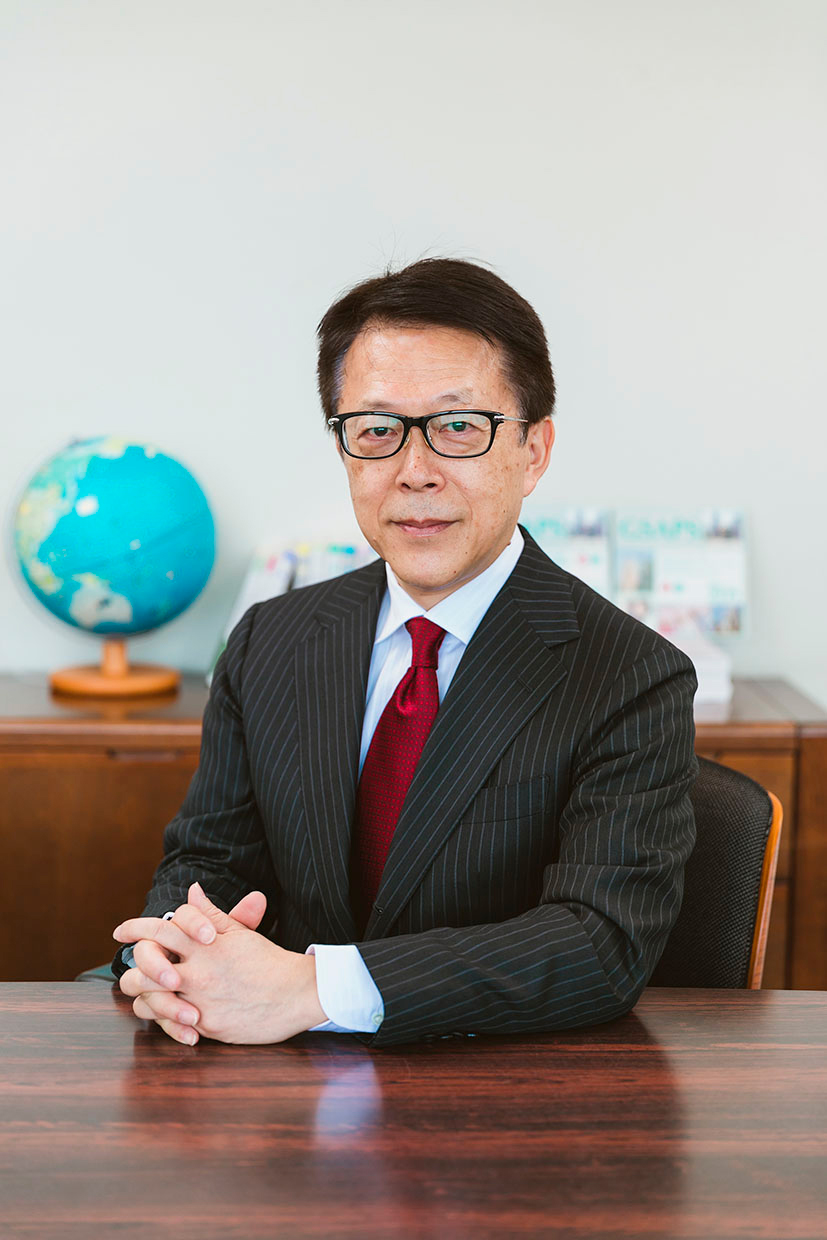Dean’s Message to Graduating Students

- Posted
- Sun, 20 Sep 2020
Waseda University Graduate School of Asia-Pacific Studies
Dean’s Message to Graduating Students

On behalf of Waseda University, Graduate School of Asia-Pacific Studies (GSAPS), I offer my heartfelt congratulations to all of you receiving graduation certificates today. I would also like to offer my sincerest congratulations and gratitude to the family members who have encouraged and supported you all.
There are 69 students completing the Graduate Program this autumn, with 60 students completing the MA program, and 9 students completing the PhD program. Since our foundation in 1998, we have produced more than 3000 master’s degree graduates from over 50 countries and regions. In addition, nearly 300 students have completed our doctoral degree program. All of you will join those graduates today.
We deeply regret that the graduation ceremony is held online in order to prevent infection of COVID-19. If an in-person graduation ceremony could be held, each student could be awarded a diploma at the Ibuka Memorial hall.
As you reflect upon the time you devoted to your studies and upon your interaction with your fellow students and faculty, nothing would please us more than knowing that all of you were able to gain a true appreciation for the philosophy of GSAPS, which can be described as “Diverse Backgrounds Common Purpose”.
Do you remember, on the day you entered GSAPS two years ago, in the welcome speech at the beginning of the orientation, I told you, “Everyday, please make 1% more effort than the day before. Only 1% is enough. Then your ability will increase 38 times in a year.” I just wanted to tell you that continuous effort is important in academics, but taking this opportunity, again I would like to remind you that continuity is the father of success. I didn’t say it at the time, but if you have continued that effort for two years, your abilities would have increased more than 1400 times higher than at the time of enrollment.
Now, with the global spread of COVID-19, we have realized that our economy and society have already become global, and that borders are merely meant as boundaries that define the scope of sovereignty. The spread of COVID-19 infection may encourage introverted thinking that it is only necessary to keep the country safe, and may tolerate the rise of nationalism that French President Macron called the “old demons”. It is at a major crossroads whether to cope with global threats together or to put our own interests first.
At the same time, looking at the differences in the spread of infection in the world, we could say that political leaders could have a more immediate effect on life and death of people than scientists and doctors can. As you may know, from this ironic fact, this year’s Ig Nobel Prize, which is a satiric prize, was awarded to nine national political leaders.
The spread of the coronavirus infection may mean that the Earth is giving humanity an opportunity to think of the future. Dr. James Lovelock, a British scientist as well as futurist, known as the proponent of the “Gaia” hypothesis, in an essay published in the journal “Science” in 1998, said that most people predicted that the next century will continue unperturbed. Prosperity will continue, and even if global warming and environmental destruction occur, it is not so serious, and even though most of us feel some anxiety but believe in the maxim “business as usual.”
Dr. Lovelock says we behave too optimistically and we are amazingly unprepared for our journey into the future. We try to guard against local hazards, but tend to ignore threats global in scale. Even though, in our history, we have experienced the death of many people from infectious diseases, we may have fallen into the illusion that human beings have been freed from such experiences by the development of science.
Dr. Lovelock was born in 1919. At the age of 97 in 2016, he published a picture book called “The Earth and I” with world-renowned scientists including Nobel Prize laureates and writers. This picture book explains, in plain language, how the Earth is in its present state, how it functions, and how we humans are affecting it.
Dr. Lovelock has long considered creating a manual for those who survive the crisis of Earth destruction that might come someday to help regenerate the planet, explaining how the system of the Earth once worked. In fact, this picture book may not be useful in such a catastrophic crisis, but it teaches us living with a narrow common sense the importance of thinking about things on a global scale.
Society now needs the power of highly qualified personnel like you who is capable of objective judgment and global networking. Faced with various risks, diverse ways of thinking and serious economic and social issues, each of you is really needed in the formation of a new global order. It is our sincere hope that you become highly skilled professionals, capable of utilizing the analytical abilities you obtained through your studies and research here at GSAPS to make contributions towards solving problems and formulating a new social order not only in the Asia-Pacific region, but on the global stage as well.
You have all completed the program here at Graduate School of Asia-Pacific Studies. It also marks the beginning of new collaborations. With each step you take forward, whole new worlds will appear.
GSAPS holds alumni gatherings regularly. When the outbreak of the new coronavirus is over, we would like to welcome you back here in campus again to celebrate your graduation.
Now everyone, let’s go and build a better future.
Congratulations again on your completion of our graduate programs. Thank you!
Hitoshi Mitomo
Dean, Graduate School of Asia-Pacific Studies, Waseda University
References:
James Lovelock (1998), “A Book for All Seasons”, Science, Vol. 280, Issue 5365, pp. 832-833.
James Lovelock et al. (2016), The Earth and I, Taschen.
- Tags
- General
